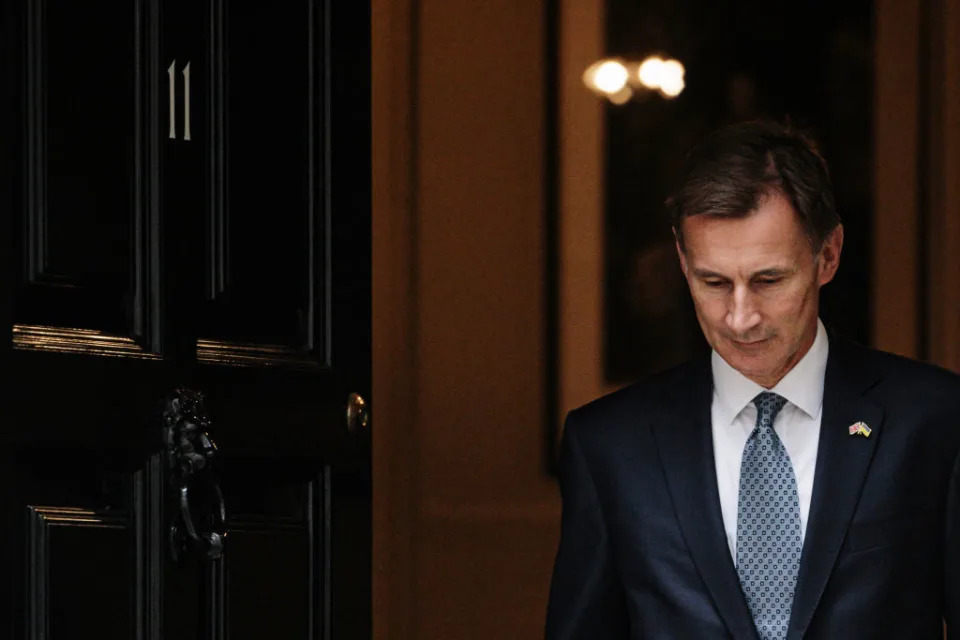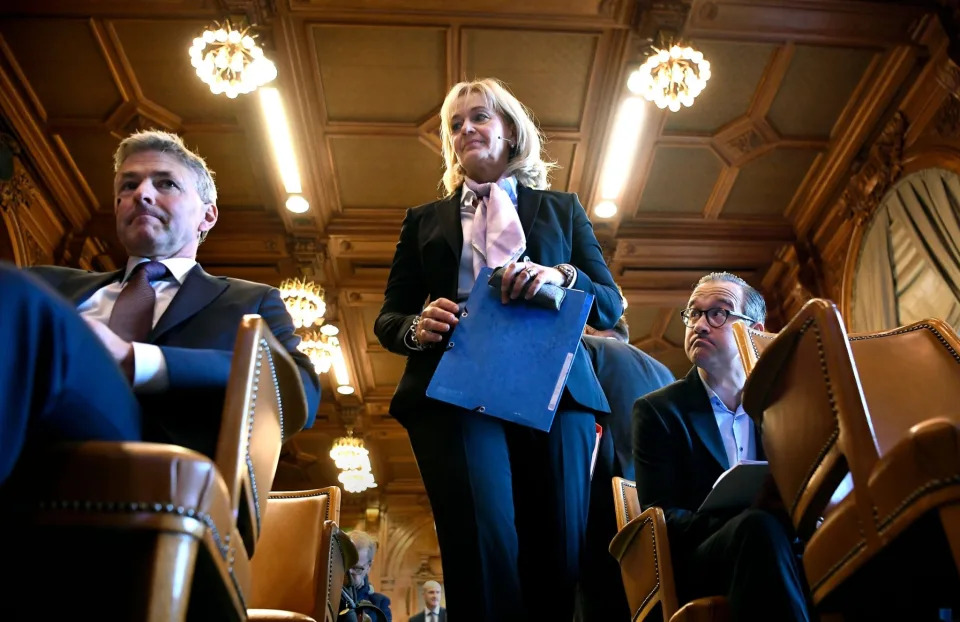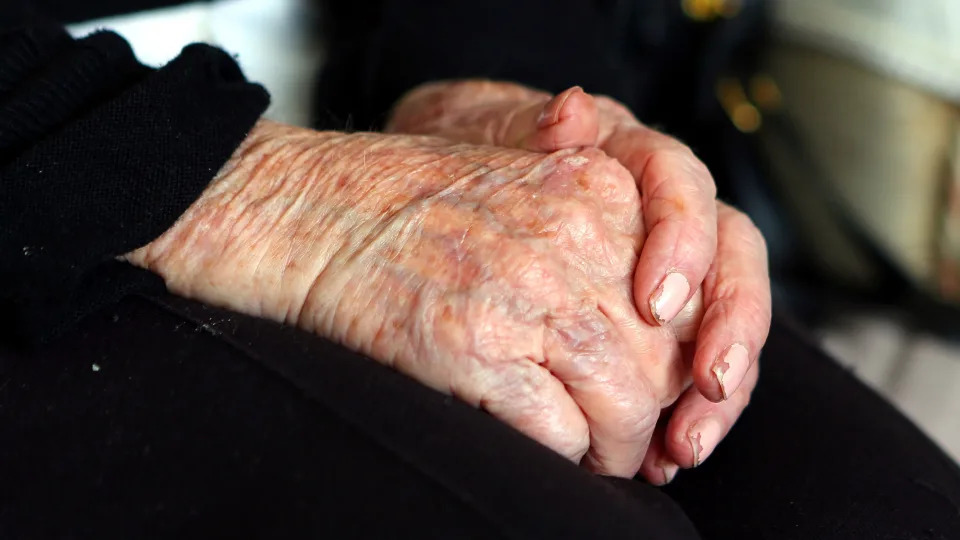Pension fund AustralianSuper to invest 8 billion pounds in Britain
Reuters
Mon, 4 March 2024
LONDON (Reuters) - The British government said on Monday that pension giant AustralianSuper was set to invest 8 billion pounds ($10.15 billion) more in the country, taking its total investment to over 18 billion pounds by the end of the decade.
"This major investment from AustralianSuper will promote growth and strengthen the UK's position as a leading financial centre, creating wealth and helping to fund public services," finance minister Jeremy Hunt said in the statement.
The announcement comes ahead of a budget update on Wednesday that Hunt is hoping will boost Conservative Prime Minister Rishi Sunak's flagging fortunes before an election later this year.
Last July, Hunt set out the Mansion House Compact, whereby 10 pension funds, including Aegon, Legal & General and Aviva, voluntarily committed to investing at least 5%, or about 50 billion pounds, in life science, fintech, biotech, clean tech and other types of high growth unlisted British companies by 2030.
"The raft of investment announcements we have seen today show that the UK remains one of the most attractive places to invest in the world," Sunak said in the statement.
"But because of the difficult, long term decisions the government has taken the economy is now turning a corner, and we must stick to the plan."
AustralianSuper, which holds more than 2.5 billion pounds in British-listed equities according to the statement, says on its website that it manages more than A$315 billion ($205 billion) of retirement savings on behalf of more than 3.3 million members.
Private markets overseas, especially debt, are top priorities for Australia's largest pension funds as they look for ways to deploy the rapidly growing A$2.4 trillion pool of retirement savings that is outgrowing the domestic market.
($1 = 0.7879 pounds)
(Reporting by Muvija M, editing by William James and Alex Richardson)
Pension funds have ‘abrogated responsibility to the UK,’ says Peel Hunt
Charlie Conchie
Mon, 4 March 2024

Peel Hunt has called on pension funds to act after the Chancellor Jeremy Hunt announced sweeping changes ahead of the budget on Wednesday.
Pension funds have “abrogated their responsibility” to the UK over the past 25 years and should prepare to disclose how much of their cash goes into British firms, one of the UK’s top investment banks has said, after Jeremy Hunt revealed plans for a sweeping shake-up of rules ahead of the budget on Wednesday.
In a note to investors today, London-listed investment bank Peel Hunt called on the FCA to implement rules that would force pension funds to disclose the geographic mix of their investments and told pension money managers to begin getting their houses in order ahead of the change.
The calls come after the Chancellor revealed plans for a major shake-up of rules ahead of the budget over the weekend that would see money managers forced to publish the make-up of their investments.
Under the proposals, underperforming schemes would also be banned from taking on new members in a bid to accelerate consolidation of the UK’s sprawling pension industry market.
The measures are seen as a means of encouraging domestic pension funds to back the British stock market after a drop-off in investment over the past two decades. Just four percent of the British stock market is now held by pension funds, down from 39 per cent in 2000, according to the think tank New Financial.
In a note to investors this morning, Peel Hunt’s head of research, Charles Hall, took aim at funds and said they had a responsibility to back the stock market.
“Pension funds have largely abrogated their responsibility to the UK over the past 25 years,” Hall said. “There are several reasons for this, including risk aversion, tax position and companies’ desire to offload their schemes. Pension funds used to be core investors in listed companies and specifically UK equities, but the latter has diminished from 44 per cent in 1998 to 4 per cent currently.”
While the FCA has set a timeline of three years for implementation, Hall called on funds to begin preparing for the changes now.
However, Hunt’s plans faced some resistance over the weekend from regulators. The FCA has reportedly refused to commit to writing new rules because there was no evidence that consumers or markets were being hampered by the current framework, the Financial Times reported.
The calls are also likely to unsettle some pension industry figures who have claimed that pension fund managers have a responsibility to their members rather than the health of the UK stock market.
One pension boss told City A.M last year that “it doesn’t make any sense to try and wind back to some anachronistic 90s situation where all UK pension funds were investing in UK companies.”
Prior to Hunt’s plans last week, the boss of the UK’s biggest private sector pension scheme, the £73bn Universities Superannuation Scheme (USS), also cautioned ministers over plans for reform.
Carol Young, chief executive of the £73bn Universities Superannuation Scheme, said she would have no problem with disclosures but would have “cause for concern” if ministers were to direct trustees as to where funds should be allocated.
“There’s no question that the primary purpose of [pensions] is to deliver in the members’ best financial interests,” Young told the Financial Times.
Charlie Conchie
Mon, 4 March 2024

Peel Hunt has called on pension funds to act after the Chancellor Jeremy Hunt announced sweeping changes ahead of the budget on Wednesday.
Pension funds have “abrogated their responsibility” to the UK over the past 25 years and should prepare to disclose how much of their cash goes into British firms, one of the UK’s top investment banks has said, after Jeremy Hunt revealed plans for a sweeping shake-up of rules ahead of the budget on Wednesday.
In a note to investors today, London-listed investment bank Peel Hunt called on the FCA to implement rules that would force pension funds to disclose the geographic mix of their investments and told pension money managers to begin getting their houses in order ahead of the change.
The calls come after the Chancellor revealed plans for a major shake-up of rules ahead of the budget over the weekend that would see money managers forced to publish the make-up of their investments.
Under the proposals, underperforming schemes would also be banned from taking on new members in a bid to accelerate consolidation of the UK’s sprawling pension industry market.
The measures are seen as a means of encouraging domestic pension funds to back the British stock market after a drop-off in investment over the past two decades. Just four percent of the British stock market is now held by pension funds, down from 39 per cent in 2000, according to the think tank New Financial.
In a note to investors this morning, Peel Hunt’s head of research, Charles Hall, took aim at funds and said they had a responsibility to back the stock market.
“Pension funds have largely abrogated their responsibility to the UK over the past 25 years,” Hall said. “There are several reasons for this, including risk aversion, tax position and companies’ desire to offload their schemes. Pension funds used to be core investors in listed companies and specifically UK equities, but the latter has diminished from 44 per cent in 1998 to 4 per cent currently.”
While the FCA has set a timeline of three years for implementation, Hall called on funds to begin preparing for the changes now.
However, Hunt’s plans faced some resistance over the weekend from regulators. The FCA has reportedly refused to commit to writing new rules because there was no evidence that consumers or markets were being hampered by the current framework, the Financial Times reported.
The calls are also likely to unsettle some pension industry figures who have claimed that pension fund managers have a responsibility to their members rather than the health of the UK stock market.
One pension boss told City A.M last year that “it doesn’t make any sense to try and wind back to some anachronistic 90s situation where all UK pension funds were investing in UK companies.”
Prior to Hunt’s plans last week, the boss of the UK’s biggest private sector pension scheme, the £73bn Universities Superannuation Scheme (USS), also cautioned ministers over plans for reform.
Carol Young, chief executive of the £73bn Universities Superannuation Scheme, said she would have no problem with disclosures but would have “cause for concern” if ministers were to direct trustees as to where funds should be allocated.
“There’s no question that the primary purpose of [pensions] is to deliver in the members’ best financial interests,” Young told the Financial Times.
The chairwoman of Sweden’s biggest pension fund—which has a track record of awful investments—quits after just 1 week on the job
Ryan Hogg
Mon, March 4, 2024

Janerikk Henriksson—TT News Agency/AFP/Getty Images
It may be almost a year since the collapse of Silicon Valley Bank set off a short-lived financial crisis across the banking industry, but one of its bigger casualties, a $120 billion Swedish pension fund, is still dealing with the effects of the fallout on its C-suite.
Alecta, which handles the pensions of a quarter of Sweden’s population, announced that its new chairwoman of the board, Carina Åkerström, had stepped down from her role just one week into the job.
"It is regrettable that Carina Åkerström has changed her assessment of her ability to fulfill her assignment as Chairman of the Board of Alecta and has chosen to resign," Kenneth Bengtsson, Alecta’s chair of the nomination committee, said in a statement.
In an unusually cryptic message, Bengtsson said no new information had come to light in the week since Åkerström’s appointment, and that no conflict of interest that “couldn’t be dealt with in the usual way” had emerged.
“During the process, we have of course asked extensive questions to Carina Åkerström about this,” Bengtsson said.
Alecta’s former interim chairman, Jan-Olof Jacke, will return to his role as interim chairperson until the fund finds someone it can keep on a longer-term basis.
A representative for Alecta declined to comment further on the press release.
The abrupt resignation of Åkerström—the former CEO of Swedish bank Svenska Handelsbanken—will do little to quell a widespread crisis of confidence in the embattled fund, which has faced disastrous losses on some of its riskier financial bets.
Alecta still reels from SVB crisis
Alecta has on multiple occasions described 2023 as one of the most turbulent times for the pension fund in its 107-year history.
But the events from the last year would suggest they might still be underselling the level of turmoil inside the fund, which is moving to reduce the risk profile of its bruised portfolio.
Åkerström’s short-lived appointment made her the fund’s first permanent chairperson since October when Ingrid Bonde stepped down in the wake of a crisis sparked by the collapse of SVB last March.
Bonde said there had been “too much focus on my person” in her resignation statement, adding that she needed to “devote my time and energy to my family and my other assignments."
The fund posted a SEKr 16 billion loss ($1.9 billion) last year thanks to its stake in embattled U.S. banks SVB, First Republic, and Signature, all of which became virtually worthless as contagion fears tore through the financial sector.
Alecta had previously fired its CEO Magnus Billing in April after the fund revealed its losses from its holdings in the American regional banks, which it said had massively damaged confidence in Alecta’s asset management operations.
C-suite flip flop
Åkerström’s u-turn is just the latest in flip flops at the executive level that have added to a sense of chaos at Alecta.
The board had initially elected former Denmark central bank chief Lars Rohde as Bonde’s successor as chairperson in January, but within a week it had reneged on this appointment.
Alecta said Rohde had accepted a position on the board of another company that bore too many similarities to Alecta, something it was unaware of during the selection process.
At the time of her surprise appointment, Åkerström appeared far from enthusiastic about being thrust into the position of leading the troubled fund.
Åkerström said her appointment was unexpected, but “sometimes unexpected things happen and I'm used to working flexibly.”
Alecta continues to battle bad bets on its investments. Last week, Alecta announced it was writing down $1.2 billion due to losses in its largest single investment, real estate developer Heimstaden Bostad.
The pension fund said the value of its holdings in the indebted landlord had declined 25% in 2023, as a steep jump in interest rates cut hit property valuations and significantly pushed up borrowing costs.
This story was originally featured on Fortune.com
Ryan Hogg
Mon, March 4, 2024

Janerikk Henriksson—TT News Agency/AFP/Getty Images
It may be almost a year since the collapse of Silicon Valley Bank set off a short-lived financial crisis across the banking industry, but one of its bigger casualties, a $120 billion Swedish pension fund, is still dealing with the effects of the fallout on its C-suite.
Alecta, which handles the pensions of a quarter of Sweden’s population, announced that its new chairwoman of the board, Carina Åkerström, had stepped down from her role just one week into the job.
"It is regrettable that Carina Åkerström has changed her assessment of her ability to fulfill her assignment as Chairman of the Board of Alecta and has chosen to resign," Kenneth Bengtsson, Alecta’s chair of the nomination committee, said in a statement.
In an unusually cryptic message, Bengtsson said no new information had come to light in the week since Åkerström’s appointment, and that no conflict of interest that “couldn’t be dealt with in the usual way” had emerged.
“During the process, we have of course asked extensive questions to Carina Åkerström about this,” Bengtsson said.
Alecta’s former interim chairman, Jan-Olof Jacke, will return to his role as interim chairperson until the fund finds someone it can keep on a longer-term basis.
A representative for Alecta declined to comment further on the press release.
The abrupt resignation of Åkerström—the former CEO of Swedish bank Svenska Handelsbanken—will do little to quell a widespread crisis of confidence in the embattled fund, which has faced disastrous losses on some of its riskier financial bets.
Alecta still reels from SVB crisis
Alecta has on multiple occasions described 2023 as one of the most turbulent times for the pension fund in its 107-year history.
But the events from the last year would suggest they might still be underselling the level of turmoil inside the fund, which is moving to reduce the risk profile of its bruised portfolio.
Åkerström’s short-lived appointment made her the fund’s first permanent chairperson since October when Ingrid Bonde stepped down in the wake of a crisis sparked by the collapse of SVB last March.
Bonde said there had been “too much focus on my person” in her resignation statement, adding that she needed to “devote my time and energy to my family and my other assignments."
The fund posted a SEKr 16 billion loss ($1.9 billion) last year thanks to its stake in embattled U.S. banks SVB, First Republic, and Signature, all of which became virtually worthless as contagion fears tore through the financial sector.
Alecta had previously fired its CEO Magnus Billing in April after the fund revealed its losses from its holdings in the American regional banks, which it said had massively damaged confidence in Alecta’s asset management operations.
C-suite flip flop
Åkerström’s u-turn is just the latest in flip flops at the executive level that have added to a sense of chaos at Alecta.
The board had initially elected former Denmark central bank chief Lars Rohde as Bonde’s successor as chairperson in January, but within a week it had reneged on this appointment.
Alecta said Rohde had accepted a position on the board of another company that bore too many similarities to Alecta, something it was unaware of during the selection process.
At the time of her surprise appointment, Åkerström appeared far from enthusiastic about being thrust into the position of leading the troubled fund.
Åkerström said her appointment was unexpected, but “sometimes unexpected things happen and I'm used to working flexibly.”
Alecta continues to battle bad bets on its investments. Last week, Alecta announced it was writing down $1.2 billion due to losses in its largest single investment, real estate developer Heimstaden Bostad.
The pension fund said the value of its holdings in the indebted landlord had declined 25% in 2023, as a steep jump in interest rates cut hit property valuations and significantly pushed up borrowing costs.
This story was originally featured on Fortune.com













